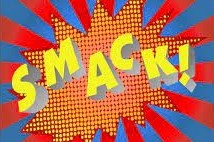4 May 2023
Another Smacking
EU and China.
By Neil Tidmarsh

It’s the politics of the playground. The cunning little kid might think it’s a clever move to crawl up to the school bully and beg “Can I be your friend? Can I be in your gang? Please, please, please?”, but he’s handing the big bully a juicy and irresistible piece of power-play. Before rewarding his new minion, the bully will gleefully and inevitably humiliate him, rubbing his nose in the muck to show him (and everyone else in the playground) who’s the boss.
Last month President Macron led a French/EU mission to Beijing, accompanied by Ursula von der Leyen and scores of French business leaders. The ostensible purpose of the mission was to encourage Beijing to take Moscow in hand about peace in Ukraine. But the presence of those businessmen from Paris suggested that Macron had a commercial agenda as well as a diplomatic one. And it seems that his eagerness to further France’s commercial interests by gratifying the sensibilities of the world’s fastest growing and second biggest economy inspired him to come up with a new political agenda as well. He shocked his European and American allies by suggesting that France – and the EU – should disassociate itself from the West’s cautious and critical attitude towards China and pursue a new entente with Beijing. He even turned his back on Taiwan.
This must have been music to the ears of the Chinese Communist Party. President Xi’s delight must have been as great as the Western leaders’ dismay. (One ex-president of the USA – no prizes for guessing which one – accused Macron of “kissing ass”, though the current US president was more tactful and restrained, at least in public. According to Le Monde, even France’s diplomats and foreign ministry were taken by surprise and left shocked and alarmed.) So how did Beijing reward its new friends in Paris and Brussels?
By giving them a good smacking.
Last week, China’s ambassador to France grabbed the headlines by declaring on French tv that a number of the EU’s member states aren’t real countries. He denied that Latvia, Lithuania and Estonia had any sovereignty. These ex-soviet states, he claimed, have had no “effective status in international law” since the collapse of the USSR. Provocatively, he included Ukraine in this list, saying that “there is no international agreement specifying their status as a sovereign country”. (Provocative but absurd – the OSCG’s Budapest Memorandum, recognising the independence and sovereignty of Ukraine and other ex-soviet states in 1994, was signed by Russia, the USA and the UK and acknowledged by France and – yes – by China. Moreover, Latvia, Lithuania, Estonia and Ukraine are all members of the United Nations, of course).
Senior officials in those three EU Baltic states made it clear that the statements were unacceptable. They asked Beijing for an explanation and a retraction, expected Brussels to do the same and hoped for a strong and unified EU response. So far they have been disappointed on all fronts.
Could the timing of this affront to France and the EU – this slap round the face, this kick in the teeth – be accidental, a simple coincidence, coming as it did so hard on the heels of Macron’s attempts to court Beijing? Unlikely. The CCP is the most controlling and controlled entity in the entire history of the world – nothing happens by accident or chance under its auspices. Could the ambassador have been speaking out of turn? Were they simply his opinions and not the opinions of the CCP as a whole? Even more unlikely. It’s an ambassador’s job to project his government’s opinions, not his own. And the consequences for a Chinese ambassador expressing opinions out of line with the CCP’s would be unthinkable, as Beijing’s ambassador to France must know. He’s still in place, Beijing’s mouthpiece, so we could perhaps translate his words as Beijing saying “We are strong and you are weak. Lap dogs must be taught who’s the boss if they want to run with wolf warriors”.
This isn’t the first time that Beijing has responded to a display of European weakness with a display of Chinese strength. In January 2021 the EU declined to join with the UK, the USA, Canada and Australia in condemning the mass arrests of pro-democracy campaigners in Hong Kong (the EU was about to sign off a trade deal with China which had been eight years in the making). A few months later, however, perhaps remembering at last that it had been awarded the Nobel Peace Prize for “advancing democracy and human rights”, the EU did a U-turn and followed the example of its allies in the free West and sanctioned four Chinese officials involved with the persecution of Uighur Muslims in Xinjiang. Beijing promptly responded by singling out the vacillating and irresolute EU for a massive and disproportionate retaliation, imposing sanctions on many MEPs, academics, institutions, MPs in member states, and all 27 ambassadors from member states and their families.
And it isn’t the first time that an EU mission to a foreign autocrat has resulted in embarrassment and humiliation, either. The thorough and very public spanking that Josep Borrell, EU Commissioner and foreign affairs chief, received on his ineptly-timed and extraordinarily ill-conceived visit to Moscow in February 2021 had MEPs and EU leaders aghast and howling for his resignation (see Bother In Brussels, Shaw Sheet issue 268, 25.02.21). And there was that humiliating and embarrassing episode in Turkey in April 2021, when Ursula von der Leyen was literally left standing – though to be fair that seems to have been a case of political in-fighting, the EU humiliating and embarrassing itself for a change rather than letting a foreign power do it for them (see Sofagate, Shaw Sheet issue 275, 15.04.21). And Macron himself was humiliated by Putin last year, returning time after time to that absurdly long table to be fed yet another bellyful of lies (Russia has no intention of invading Ukraine, Macron informed the EU as Russia’s tanks were lined up all along the border, Vladimir himself told me so) and to be slapped down by Moscow when it denied and contradicted his claims about withdrawal agreements discussed in those meetings.
Macron says that his approach to China is all about building what he calls “strategic autonomy” for Europe – the belief that the EU should occupy a place on the world stage equal to that of the USA and China, and so be independent of both those great powers and provide a ‘third pole’ for the rest of the world. It’s a fine idea in theory but a foolish and delusional one in practice. Contemporary Europe simply doesn’t have the military might, financial muscle, natural resources, political apparatus or leadership to compete on equal terms with the USA or China – and to naively believe or disingenuously pretend that it does is simply to risk humiliation and embarrassment, as we are seeing time after time. Both Washington and Beijing know that it’s foolish and delusional (as does Moscow – the fact that the EU has difficulty holding its own against a country like Russia says it all).
Perhaps the EU’s leaders think that playing the two great powers off against each other will obtain the best of both worlds – security under the protection of the US military, and wealth from trade with China – while leaving the obligations implicit in that Nobel Peace Prize to someone else. But that would be a very dangerous (not to say dishonest and dishonourable) game. You can’t run with both the school prefect and the school bully indefinitely; sooner or later one or both will turn on you and punish you. Besides, it looks more as if it’s the EU that’s being played; Beijing understands only too well that the real motive behind the idea of European “strategic autonomy” is the EU’s endemic anti-Americanism and resentment of its dependence on the USA – and Beijing knows exactly which buttons to press in order to manipulate the weak and to divide the opposition.
So how should the EU respond to those undiplomatic words of China’s ambassador to France? Repay provocation and absurdity with more of the same – suggest, perhaps, that China, being a product of the Mongol Empire (it was one of several khanates created and ruled by the Mongol conquerors), has had no effective legal status since the collapse of the Mongol Empire in the 14th century? Unlikely. But it’s best not to hold our breath while we wait for any kind of response.


